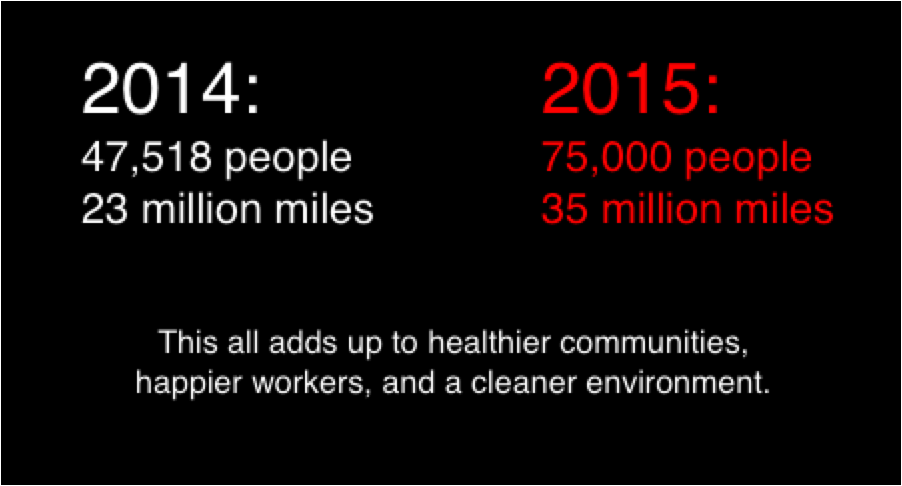What are you doing this summer?
If you said, “Logging every mile I ride between May 1 and September 30,” that’s a very good answer. If you said, “Hosting a local challenge to support the National Bike Challenge’s goal of 35 million miles logged by 75,000 people,” that’s even better.

The National Bike Challenge started with an internal campaign trying to get Kimberly Clark employees to ride in 2009. It went national in 2012 under the guidance of the League of American Bicyclists. Last year, 47,518 people logged 23 million miles. That's pretty good -- but People for Bikes, which is now running the Challenge, thinks 2015 could be the year to blow the doors off this thing.
But they won’t get to 35 million miles without the teamwork of local and state organizations all across the country.
PfB’s National Bike Challenge coordinator, Meghan McCloskey, spoke to Alliance members yesterday to explain the ins and outs of hosting a local challenge.
Note to organizations that have hosted before: There are some slight changes to the application process this year, so pay careful attention to the guidelines and registration materials!
Why you should host a local challenge: How it can benefit your community and your organization
The National Bike Challenge is a free tool for your organization to use, to get as much out of as you can, and to get community members involved in your group’s goals, said McCloskey.
The benefits to your community are obvious: You’ll be giving community members a new, fun, and healthy way to engage with other each other. What’s better than a little springtime riding, spiced with some friendly competition?
Your organization stands to gain publicity and even some funds if you play your cards right. Anyone in your territory that logs on to the National Bike Challenge website will see your logo. You’ll be able to post organizational news, Challenge updates, relevant articles, and other event listings in the news section of the homepage. You can write periodic posts about the top riders, as Bike Walk Wichita did as motivation for the community. Participants can use the comments section to interact, too.
Plus, you’ll have access to all the names and email addresses of all the participants in your area -- a great tool to build membership. And if you attract sponsorship for the local challenge, you keep the proceeds.
How to host a local challenge
The application deadline is April 10. Host organizations should indicate on the application what counties they’d like to host. PfB will review requests to hosti just certain zip codes on a case-by-case basis, but the default is to divide territory by county. They’ll get back to you about what territories you’re approved to host with plenty of time for organizing before the challenge begins in May.
How to promote your local challenge
 Once you’re approved and you have your territories, you can do outreach using the National Bike Challenge free marketing poster, postcard, and social media buttons, all already branded with messaging. You can promote the local challenge on your own website, on social media, and on the Challenge website.
Once you’re approved and you have your territories, you can do outreach using the National Bike Challenge free marketing poster, postcard, and social media buttons, all already branded with messaging. You can promote the local challenge on your own website, on social media, and on the Challenge website.
“The Challenge has been a game changer for cycling in our area,” said Rob Gusky, Challenge Administrator for the Fox Cities Cycling Association in Appleton, Wisconsin, which won the Midwest region last year. “It has provided us with contacts for thousands of local cycling supporters.” FCCA’s homepage on the website was constantly updated with news and local events, and their Facebook page was an active online meeting place to talk about all things Challenge.
Bike Pittsburgh and Bike Cleveland had a friendly Rust Belt Battle, at the end of which Bike Pittsburgh sent the trophy to Bike Cleveland with a note warning them to “watch your back tires” in 2015.
Details
- Preference is given to previous Challenge hosts.
- Anyone who signs up for the National Bike Challenge is automatically registered in their local challenge -- they don’t need to specifically sign up for yours.
- State-based orgs are treated as any other; they should just let PfB know what counties they want to represent.
- Tracking apps like Strava can be used to count miles.
- Meghan will look into how to treat Canada, which holds Bike Month in June.
- Riders that have participated in the Challenge in previous years don’t have to sign up again. They’re still in the system. Hosts, of course, have to re-register.
- Age limit: 13 and up
- PfB will look at special cases if an organization wants to carve a zip code out of another organization’s larger territory.
- Workplaces and teams fall under the Local Challenge if they are in the designated region.
- No marketing plan is required. PfB won’t monitor the outreach you do; they just encourage you to promote the Challenge as much as possible.
- Transport riding and sport/leisure riding are separate categories. Transport is anything you could do in a car, like commuting.
More information is available here. You can contact Meghan at This e-mail address is being protected from spambots. You need JavaScript enabled to view it and she’ll be happy to answer your questions.

